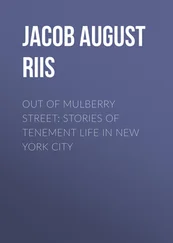Jacob August Riis - A Ten Years' War - An Account of the Battle with the Slum in New York
Здесь есть возможность читать онлайн «Jacob August Riis - A Ten Years' War - An Account of the Battle with the Slum in New York» — ознакомительный отрывок электронной книги совершенно бесплатно, а после прочтения отрывка купить полную версию. В некоторых случаях можно слушать аудио, скачать через торрент в формате fb2 и присутствует краткое содержание. Издательство: Иностранный паблик, Жанр: foreign_prose, sociology_book, foreign_antique, на английском языке. Описание произведения, (предисловие) а так же отзывы посетителей доступны на портале библиотеки ЛибКат.
- Название:A Ten Years' War: An Account of the Battle with the Slum in New York
- Автор:
- Издательство:Иностранный паблик
- Жанр:
- Год:неизвестен
- ISBN:нет данных
- Рейтинг книги:4 / 5. Голосов: 1
-
Избранное:Добавить в избранное
- Отзывы:
-
Ваша оценка:
- 80
- 1
- 2
- 3
- 4
- 5
A Ten Years' War: An Account of the Battle with the Slum in New York: краткое содержание, описание и аннотация
Предлагаем к чтению аннотацию, описание, краткое содержание или предисловие (зависит от того, что написал сам автор книги «A Ten Years' War: An Account of the Battle with the Slum in New York»). Если вы не нашли необходимую информацию о книге — напишите в комментариях, мы постараемся отыскать её.
A Ten Years' War: An Account of the Battle with the Slum in New York — читать онлайн ознакомительный отрывок
Ниже представлен текст книги, разбитый по страницам. Система сохранения места последней прочитанной страницы, позволяет с удобством читать онлайн бесплатно книгу «A Ten Years' War: An Account of the Battle with the Slum in New York», без необходимости каждый раз заново искать на чём Вы остановились. Поставьте закладку, и сможете в любой момент перейти на страницу, на которой закончили чтение.
Интервал:
Закладка:
Yet it is for these that the "interests" of which the fire chief spoke rush into battle at almost every session of the legislature, whenever a step, no matter how short and conservative, is to be taken toward their improvement. No winter has passed, since the awakening conscience of the people of New York city manifested itself in a desire to better the lot of the other half, that has not seen an assault made, in one shape or another, on the structure of tenement house law built up with such anxious solicitude. Once a bill to exempt from police supervision, by withdrawing them from the tenement house class, the very worst of the houses, whose death rate threatened the community, was sneaked through the legislature all unknown, and had reached the executive before the alarm was sounded. The governor, put upon his guard, returned the bill, with the indorsement that he was unable to understand what could have prompted a measure that seemed to have reason and every argument against it, and none for it. But the motive is not so obscure, after all. It is the same old one of profit without conscience. It took from the Health Department the supervision of the light, ventilation, and plumbing of the tenements, which by right belonged there, and put it in charge of a compliant Building Department, "for the convenience of architects and their clients, and the saving of time and expense to them." For the convenience of the architect's client, the builder, the lot was encroached upon, until of one big block which the Tenement House Committee measured only 7 per cent. was left uncovered for the air to struggle through; 93 per cent. of it was covered with brick and mortar. Rear tenements, to the number of nearly 100, have been condemned as "slaughter houses," with good reason, but this block was built practically solid. The average of space covered in 34 tenement blocks was shown to be 78.13 per cent. The law allowed only 65. The "discretion" that pens tenants in a burning tenement with stairs of wood for the builder's "convenience" cut down the chance of life of their babies unmoved. Sunlight and air mean just that, where three thousand human beings are packed into a single block. That was why the matter was given into the charge of the health officials, when politics was yet kept out of their work.
Of such kind are the interests that oppose betterment of the worker's hard lot in New York; that dictated the appointment by Tammany of a commission composed of builders to revise its code of building laws, and that sneer at the "laughable results of the late Tenement House Committee." Those results made for the health and happiness and safety of a million and a half of souls, and were accounted, on every humane ground, the longest step forward that had yet been taken by this community. For the old absentee landlord, who did not know what mischief was afoot, we have got the speculative builder, who does know, but does not care so long as he gets his pound of flesh. Half of the just laws that have been passed for the relief of the people he has paralyzed with his treacherous discretion clause, carefully nursed in the school of practical politics to which he gives faithful adherence. The thing has been the curse of our city from the day when the earliest struggle toward better things began. Among the first manifestations of that was the prohibition of soap factories below Grand Street by the act of 1797, which created a Board of Health with police powers. The act was passed in February, to take effect in July; but long before that time the same legislature had amended it by giving the authorities discretion in the matter. And the biggest soap factory of them all is down there to this day, and is even now stirring up a rumpus among the latest immigrants, the Syrians, who have settled about it. No doubt it is all a question of political education; but are not a hundred years enough to settle this much, that compromise is out of place where the lives of the people are at stake, and that it is time our years of "discretion" were numbered?
And, please God, the time is at hand. Here, set in its frame of swarming tenements, is a wide open space, some time, when enough official red tape has been unwound, to be a park, with flowers and grass and birds to gladden the hearts of those to whom such things have been as tales that are told, all these dreary years, and with a playground in which the children of yonder big school may roam at will, undismayed by landlord or policeman. Not all the forces of reaction can put back the barracks that were torn down as one of the "laughable results" of that very Tenement House Committee's work, or restore to the undertaker his profits from Bone Alley of horrid memory. It was the tenant's turn to laugh, that time. Down half a dozen blocks, among even denser swarms, is another such plot, where football and a skating pond are being planned by the children's friends. We shall hear the story of these yet, and rejoice that the day of reckoning is coming for the builder without a soul. Till then let him deck the fronts of his tenements with bravery of plate glass and brass to hide the darkness within. He has done his worst.
We can go no further. Yonder lies the river. A full mile we have come, through unbroken ranks of tenements with their mighty, pent-up multitudes. Here they seem, with a common impulse, to overflow into the street. From corner to corner it is crowded with girls and children dragging babies nearly as big as themselves, with desperate endeavor to lose nothing of the show. There is a funeral in the block. Unnumbered sewing-machines cease for once their tireless rivalry with the flour mill in the next block, that is forever grinding in a vain effort to catch up. Heads are poked from windows. On the stoops hooded and shawled figures have front seats. The crowd is hardly restrained by the policeman and the undertaker in holiday mourning, who clear a path by force to the plumed hearse. The eager haste, the frantic rush to see,—what does it not tell of these starved lives, of the quality of their aims and ambitions? The mill clatters loudly: there is one mouth less to fill. In the midst of it all, with clamor of urgent gong, the patrol wagon rounds the corner, carrying two policemen precariously perched upon a struggling "drunk," a woman. The crowd scatters, following the new sensation. The tragedies of death and life in the slum have met together.
Many a mile I might lead you along these rivers, east and west, through the island of Manhattan, and find little else than we have seen. The great crowd is yet below Fourteenth Street, but the northward march knows no slackening of pace. As the tide sets uptown, it reproduces faithfully the scenes of the older wards, though with less of their human interest than here where the old houses, in all their ugliness, have yet some imprint of the individuality of their tenants. Only on feast days does Little Italy, in Harlem, recall the Bend when it put on holiday attire. Anything more desolate and disheartening than the unending rows of tenements, all alike and all equally repellent, of the uptown streets, it is hard to imagine. Hell's Kitchen in its ancient wickedness was picturesque, at least, with its rocks and its goats and shanties. Since the negroes took possession it is only dull, except when, as happened last summer, the remnant of the Irish settlers make a stand against the intruders. Vain hope! Perpetual eviction is their destiny. Negro, Italian, and Jew, biting the dust with many a bruised head under the Hibernian's stalwart fist, resistlessly drive him before them, nevertheless, out of house and home. The landlord pockets the gate money. The old robbery still goes on. Where the negro pitches his tent, he pays more rent than his white neighbor next door, and is a better tenant. And he is good game forever. He never buys the tenement, as the Jew or the Italian is likely to do, when he has scraped up money enough to reënact, after his own fashion, the trick taught him by his oppressor. The black column has reached the hundredth street on the East Side, and the sixties on the West, 2 2 There is an advanced outpost of blacks as far up as One Hundred and Forty-Fifth Street, but the main body lingers yet among the sixties.
and there for the present it halts. Jammed between Africa, Italy, and Bohemia, the Irishman has abandoned the East Side uptown. Only west of Central Park does he yet face his foe, undaunted in defeat as in victory. The local street nomenclature, in which the directory has no hand,—Nigger Row, Mixed Ale Flats, etc.,—indicates the hostile camps with unerring accuracy.
Интервал:
Закладка:
Похожие книги на «A Ten Years' War: An Account of the Battle with the Slum in New York»
Представляем Вашему вниманию похожие книги на «A Ten Years' War: An Account of the Battle with the Slum in New York» списком для выбора. Мы отобрали схожую по названию и смыслу литературу в надежде предоставить читателям больше вариантов отыскать новые, интересные, ещё непрочитанные произведения.
Обсуждение, отзывы о книге «A Ten Years' War: An Account of the Battle with the Slum in New York» и просто собственные мнения читателей. Оставьте ваши комментарии, напишите, что Вы думаете о произведении, его смысле или главных героях. Укажите что конкретно понравилось, а что нет, и почему Вы так считаете.












